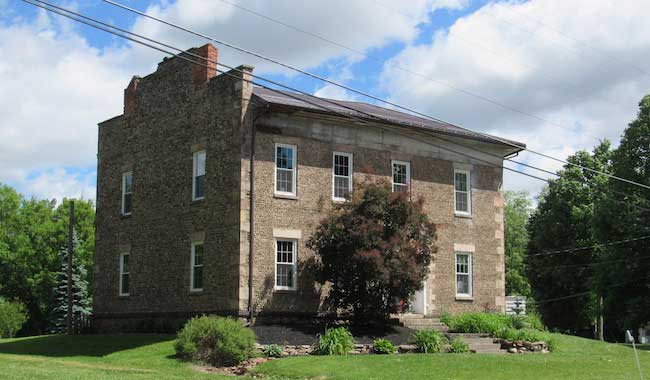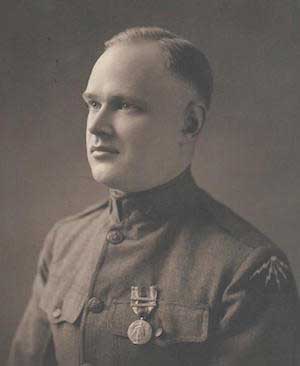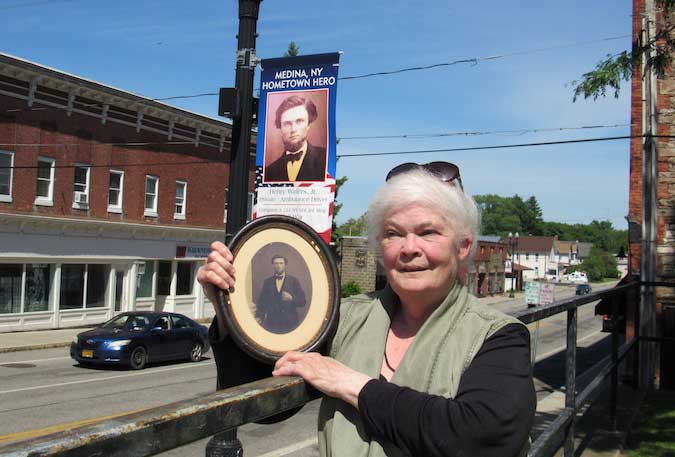Hometown Hero banners in Medina for first time include a Civil War soldier
Henry Waters Jr., after serving under General Grant, returned to Medina and became a community leader
MEDINA – Patty Blackburn is very proud of her ancestry, especially her great-grandfather who served in the Civil War. Last year she was looking at the banners which had been hung throughout Medina paying tribute to veterans from Medina who have served their country, and realized there were no veterans from the Civil War.

Patty Blackburn of Medina holds a pin which belonged to her great-grandfather Henry Waters, who served in the Civil War. He is the first Civil War soldier to be honored on a banner in downtown Medina.
Mary Woodruff, a Ridgeway town councilwoman, coordinated the effort to get the banners in Medina. There are 107 banners of veterans so far, with more expected next year.
“I thought it was such an honorable thing for Mary Woodruff to do,” Blackburn said. “When I realized there were no soldiers from the Civil War I asked if she would like one. I had been looking at this picture of Henry on my wall all my life. He had it made for his wife when he went to war.”
Blackburn took down the picture of her great-grandfather Henry Waters Jr., gathered up his memorabilia and called Woodruff.
Blackburn said Henry was 25 when he bought a $40 Sharps rifle and went to war. He served with the 151st New York Volunteers under General Grant and the Grand Army of the Republic. Henry was in the honor guard when General Lee left the court house at Appomattox after surrendering.
“The men were told to be 100 percent respectful to Lee,” Blackburn said. “Lee had gone to the court house alone, because he didn’t want his men to be humiliated.”
Henry served at many battles of the Civil War, including Spotsylvania, Cold Harbor, Third Winchester and Appomattox. He was separated from Federal service in Washington, D.C. on June 26, 1865.
Henry was born on April 11, 1837 in Palmyra, one year after the Alamo, Blackburn explained. His parents were one of the early settlers of Ridge Road. His father Henry first went to Batavia in 1828 and after looking about the section for a week, he returned home where he decided to remain, as land in the Holland tract was too expensive considering the amount of work which would have to be done to prepare it for cultivation.
Then in the fall of 1829, Henry was attracted to a group of pioneers traveling from Connecticut and he joined them, traveling with them to Batavia. At this point he learned of a former acquaintance who had taken up land northwest of what is now Albion, and Henry decided to pay him a visit and look at land there.
He set forth upon his horse and made good time until he reached the Alabama swamp, where he became confused and decided to return to Batavia. His next attempt was in the company of Uri Moore, who at the time was in Batavia conducting business at the Holland Land Office. Henry rode with Moore as far as his hotel in Medina, where he stayed the night, continuing to Ridgeway the next day.
Henry returned to Palmyra to get his family, sending them on the canal. He and his son Henry Jr. then rode on horses and drove a team of oxen hitched to a wagon loaded with essentials. Their new home was the large cobblestone house at the corner of Ridge Road and Oak Orchard River Road. Blackburn said there was a general store on the first floor.

This cobblestone house at the corner of Ridge Road and Oak Orchard River Road at Oak Orchard on the Ridge is the ancestral home of Patty Blackburn of Medina. Her great-grandfather Henry Waters Jr., who lived there, is the first Civil War soldier to be memorialized on one of the banners hanging throughout downtown Medina.
Henry Jr. went to school at Oak Orchard on the Ridge and was very attentive, except for several days one spring when high water washed out the log bridge on Oak Orchard Creek. His father was one of the settlers who went to Rochester and insisted upon an improved road through the flats, and succeeded in getting a log bottom road, which was a vast improvement.

Provided photos: Alonzo Waters is a great-uncle of Patty Blackburn of Medina. He served in the 308th Field Artillery 78th Division during World War I. Blackburn’s great-grandfather was in the Civil War, and she has had his picture put on one of the banners paying tribute to veterans, which line the streets downtown.
Gilbert Howell, a colonel who served in the War of 1812 in the local area, took up the land on the corner of Ridge Road, south of the Waters’ property. Howell did considerable work for Henry in exchange for help in building his first buildings.
Henry Jr. married Triphene Achilles, daughter of Alfred Achilles, who took up 149 acres adjoining Henry in 1837. Henry purchased land adjoining his parents, where he lived all his life. He died Oct. 30, 1903.
Henry Jr. had a son Frank, who served the town of Ridgeway as supervisor from 1908 to 1911, and was chosen chairman of the board in 1910. He was elected to the Assembly in 1910 and re-elected in 1911. Information provided by Blackburn states Frank purchased the 20-room brick home on Ridge Road near his boyhood home, which he named “Riverside.” Blackburn said she thought his boyhood home was the large cobblestone home on the corner of Ridge Road and Oak Orchard River Road, but she had never heard it referred to as “Riverside.”
No one can confirm there was a brick home, and it is believed it is a reference to the cobblestone home, as there is no information available about a second 20-room home in the area. However, William Mesler, who has lived across the road for 70 years, said the back of the cobblestone home was partly brick.
Mesler also provided information about having talked to Jennie Beals, who lived in the hollow near the creek and told him there used to be a tunnel running from her house to the cobblestone house which was part of the Underground Railroad. Mesler then said a member of the Waters family years ago lived in a big house on Oak Orchard Creek Road, north of the cobblestone house, but he didn’t know which Waters.

Patty Blackburn’s cousin Robert Waters also served his county as a member of the Army during World War II.
Former Orleans County historian Bill Lattin checked an 1813 atlas in his possession and came up with the following information.
The Honorable Frank Waters (Frank Jr.’s father) purchased 26 acres at Oak Orchard Village on Ridge Road. It consisted of 10 acres of apple trees, five acres of peach trees and 2 acres of pear trees. Crops raised were wheat, corn and potatoes, which thrived because of a good well and the creek nearby.
It also describes a “commodious farm mansion of 20 rooms built of stone,” (obviously referring to Riverside) and a grain barn, storage house, tenant house and cooper shop.
Henry Waters Jr. isn’t the only veteran in Blackburn’s past who served his country. Her parents were Lewis and Dorothy Waters. Lewis was a brother of Alonzo Waters, noted publisher of the Medina Journal Register, Harold Waters and Viola Waters. Alonzo served with the 308th Field Artillery 78th Division during World War I. Alonzo’s son was the late Robert Waters, pillar of the Medina community who also became publisher of the Medina Journal Register. Robert served with U.S. Army during World War II.
Blackburn thinks it would be appropriate for the next round of banners to include Alonzo and Robert.







































































